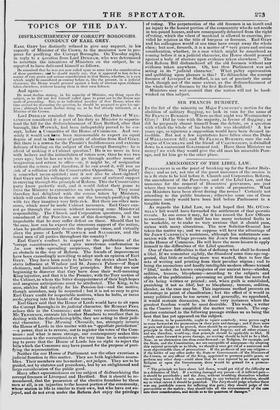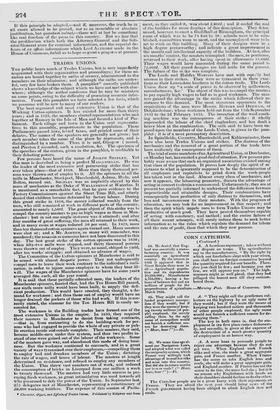AMENDMENT OF THE LIBEL LAW.
PARLIAMENT is on the point of breaking up for the Easter Holy- days ; and as yet, not one of the great measures of the session is in a fit state to be laid before it. Church and Corporation Reform, the amendment of the Poor-laws, and of the Libel Law, and the measures for the removal of Dissenters' grievances, are just where they were months ago—in a state of preparation. What can Ministers have been about during the recess? Certainly not attending to the public business; otherwise some one of these measures surely would have been laid before Parliament in a tangible form. As regards the Libel Law, we had hoped that Mr. °Vox- NELL'S bill would have forwarded the settlement of that gurrstio verata. In one sense it may, for it has roused the Law Officers to exertion ; but the bill itself has too many technical faults to he workable, or to make us very anxious that it should pass, unless with many alterations. The new Solicitor-General has taken the matter up; and we suppose will have the advantage of Sir Jourr CAMPBELL'S assistance, although his unfortunate con- nexion with the Whigs prevents Sir JOHN from obtaining a seat in the House of Commons. He will have the more leisure to apply himself to the difficulties of the Libel question.
One of these difficulties is that of defining what shall be deemed a libel. If we remember rightly, the Standard some time ago sug- gested, that little or nothing more was wanted, than to free the acts of writing and printing from their peculiar stigma ; and to bring the anomalous and hardly intelligible modern offence termed "libel," under the known categories of our ancient laws—slander, sedition, treason, blasphemy—according to the subjects and objects of the publication; presuming no guilt from the mere fact of its being written or printed ; and, when guilt is established, punishing it not as libel, but as blasphemy, treason, sedition, slander, as the case may be. This ingenious method presents an advantage in point of classification; but the effect of it would in many political cases be too severe; and generally, we apprehend, it would restrain discussion, in those very instances where the greatest freedom would be most desirable. This week, a writer in the- Courier has simplified the matter very much. The sug- gestion contained in the following passage strikes us as being the best that has yet appeared on the subject.
" Actions, to be p hable, ought to injure somebody; some person ought to come forward at the prosecution to show pain and damage; and if there were no pain and damage to be proved, there should be no prosecution. That is the principle in theft, and inflicting wounds, and forgery, and all other climes; and we, therefore, would say, that principle should be applicable to libel. If nobody came forward to prove damage, no writing should be held to be a libel. Now, as no abstraction can thus come forward—as Religion, for example, and the State, and the Constitution, are not susceptible of annoyance—by adopting this rational principle as to libels, we should at once get rid of a numerous and most objectionable class of prosecutions. If the professor of any one religion-- if the holder of any office under thc State or Government—if the Ministers of the Crown, or any officer of the King, appointed to preserve public peace, or perform any other duty—could show that he was injured by an attack upon Religion or upon the Government, there would be ground for a prosecu. thin. • • •
" The principle we have above laid down, would get rid of the difficulty as to a definition of libel. If a writing damaged any person—if it inflicted pain— it should be punishable ; and the Jury, without troubling themselves whether the writing were a libel or not, according to any technical definition, should say to what extent it should be punished. The Jury should judge whether there was any justifiable reason for inflicting this pain ; they bhould judge of the provocation or the malice ; they should take all the circumstances of the case into their consideration, and decide as $o the quantum of damages." If this principle be adopted,—and if, moreover, the truth he in aU cases allowed to be proved, not as an invariable or absolute justification, but quantum vuleat,—there will at last be something like real freedom of the press in this country. But we tear that the predilection which both the Attorney-General and the Soli- citor-General avow for criminal informations, and the especial de- fence of ea; qtficio informations which Lord ALTHORP made in the House of Commons, forbid us to hope so great a prog le is at present.





















 Previous page
Previous page